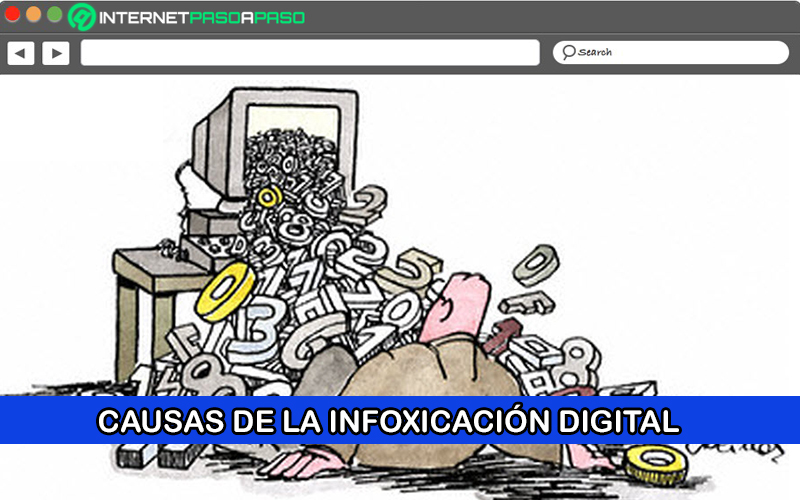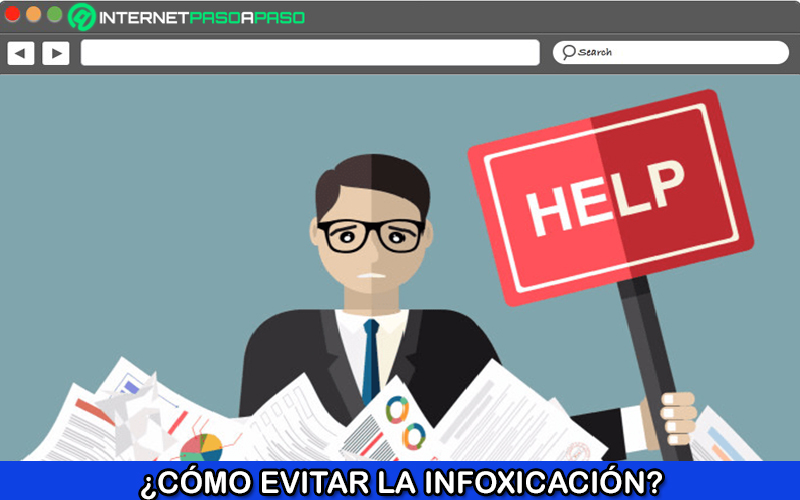
Index:
UPDATED ✅ Do you want to know about information overload on the Internet and how to avoid it? ⭐ ENTER HERE ⭐ and Learn Everything ✅ FROM ZERO ✅
It is no secret to anyone that the arrival of the Internet has transformed all aspects of society and thus has caused a real revolution in the world. That is why practically all people make use of digital platforms, electrical devices of various types, profiles on social networks, etc.
In this sense, today, the Internet allows access to endless information in a simple and fast way, with just one click. Whereas, previously, such information was only stored in libraries. Due, traditional media have passed to the side when it comes to informingsince users they prefer to take advantage of the wide variety of digital media at hand.
But, this is not always entirely favorable. Since, if pertinent strategies and criteria are not handled, easily a computer overload or excess of information is generated which is also known as “Infoxication”. To learn what this term is about, how it influences the digital experience and how it can be avoided, We invite you to read this post.
What is infoxication and how does it influence my digital experience?
Basically, infoxication is defined as the information overload that exists in the online world and that prevents delving into any topic. Since, it produces the impossibility of focusing on specific information or data, due to the constant bombardment that exists in digital media. For this reason, it is also known as “information overload” or “information overload”.
In general, infoxication is generated by the continuous flow of information that comes from social networks, blogs, websites, search engines, etc.. In this way, so much information is gathered that, results in a crash for users and, therefore, decide not to consume said data in view of the unmanageable volume of content they obtain.
Now, despite the fact that new technologies have opened the door to the creation of content to provide an optimal digital experience to Internet users, the truth is that this has had a negative impact for the uncontrolled way of providing information. As a consequence, infoxication causes discomfort, anguish, nervousness, stress and poor judgment; therefore, it has been classified as a disease of the 21st century.
With which, it will be easier to know if you are infoxicado or not and that is why, below, we mention each of these signs:
- Checking the digital notifications received, repeatedly: If you check your smartphone every time you get an alert and on certain occasions, you can’t wait and you need the immediacy of this; you may suffer from infoxication. Which can cause serious time optimization problems.
- Read diagonally and without deepening: As an excuse to have more time and consume more information, users “infoxicados” They tend to read diagonally and without delving into the subject, without defining the objective and without planning the appropriate time to do so. Considering that, it is usual to read in zigzag in order to have a good criterion on the read data.
- Depression due to inefficiency in performing tasks: The consequence of the oversaturation of information to which people are exposed, leads them to infoxication and this, generates a depression for not having achieved what he was really looking for.
- Blocking from information overload: The constant flow of information offered by infoxication (news, emails, messages, etc.) has the capacity to overwhelm Internet users so much that they end up blocking them for not being able to manage said data. Which prohibits Internet users from achieving optimal productivity.
Uncontrolled information on the Internet What are the main causes that lead to infoxication?

Basically, this is all caused due to insecurity or inexperience of Internet users when dealing with a topic that they do not know well and as a consequence, they look for all the sources of information that are within their reach. Also, infoxication occurs due to the lack of criteria during the search processesas well as for poor quality information sources, for wanting to know everything and due to lack of digital resources.
Below, we explain each cause and some more:
Lack of criteria in searches
When searching for information, many users want to find everything they need from a single source. But, in general, this never happens and if it does, it is not advisable to rely on a single source of information for it. Therefore, for accuracy, a dose of self-criticism is needed and the ability to split the content to find the right answers.
Poor quality information sources
Another latent cause to give rise to infoxication refers to the various sources of information that are classified as poor quality and to which users go because they do not know how to choose digital media appropriately. Either because they are sites with incomplete content or because of lack of clarity in them. Which forces Internet users to resort to other means that complement the data in question.
for wanting to know everything
Many people start from the famous motto “Information is power” and, although it is sometimes reasonable, in certain circumstances it can become harmful when these people they take him to extermination and therefore, they end up poisoned. However, it is necessary to take into account that it is not possible to know everything or want to cover all the areas of a certain topic. Rather, it is interesting focus on a specialty and know how to do it in an organized way.
Lack of digital resources
Ignorance of the existence of all those tools that facilitate the performance of tasks, can also lead to infoxication. Since, in these cases, people choose to perform unnecessary manual work that is completely routine and heavy; Thus, they lead to infoxication. Consequently, it is ideal to take advantage of automation and digitization in all areas of work.
Accumulate information “just in case”
Because of its striking titles, there are many items that users prefer to store “just in case” and so, without knowing what the post is about and just by scanning it, they end up saving a large amount of information that, in reality, it is unnecessary. This, without a doubt, also leads to infoxication because Internet users they will not have the time required to assimilate the enormous flow of data that they accumulated over a period of time and so, they feel anguish and stress because of it.
Comparison between the different sources of information
When doing exhaustive information searches on the Internet, it is very easy to fall into the comparison between numerous websites. In that sense, you acquire numerous results that, due to their magnitude, are very difficult to manage. At this point, netizens they end up being blocked by the inability to internalize all the sources of information visited and thus, information overload begins.
Social networks as a means of communication Why shouldn’t you believe everything your friends share on Facebook or Twitter?

Over time, social networks have been identified as a means of communication, in view of the fact that they allow carrying out fast, immediate and effective communication because users have the possibility to publish and receive information in real time, with others; no matter how far away they are. However, due to the handling of the different users, many have criticized the veracity of these platforms.
Therefore, despite the fact that social networks are of great importance in the Information Society, the truth is that they also show vulnerability because not everyone who has an Internet presence uses its tools in the most estimable way. For this reason, it is noted that it is not advisable to believe everything that the users of these apps shareespecially of Facebook Y Twitter for its success in conveying information.
In that sense, Not everything they post on social media is true.. Therefore, it is convenient to verify the sources from which certain data come from in order to verify the accuracy of the information. Considering that, despite the fact that thousands or millions of users have reacted to a certain publication with a like, it means that what it says is real or valid.
Due to this situation, beyond considering social networks as a means of information, they have been classified as a means of manipulation when other people misuse them, irresponsibly and insolently through fake news (fake news). Hence, the reason why it is essential to be aware of it, to question what they publish, check it with other sources of information and, in short, not believing everything they share.
Tips to avoid exposing yourself to information overload for a more productive online experience

Fortunately, it is possible to avoid infoxication or excess information at the digital level through several tips that you can implement. With this, you will be able to acquire a more productive online experience and the search processes in this environment will be much more profitable.
Here are the best tips to avoid information overload:
Find quality information sources
An optimal solution to avoid exposing yourself to an excess of information is based on find and use effective sources of information. Which means that, when undertaking your search online, you must prioritize quality over quantity with the aim that infoxication does not take over you. So, for example, you can choose only two or three main sources of information for each topic you follow. With this, you will avoid saturating yourself with so much data that you end up stressing yourself out.
set your priorities
It is also important to determine a priority of tasks that, in general, they have to be established by their relevance depending on the information you need to locate. In this way, you can choose to specify your main objectives for it and in this way, you will know what are your highest priorities in order to implement a search based on these points.
Set a maximum time to perform searches
If you want to avoid infoxication, it is also essential that mark a maximum time to do your information searchesn. In other words, it is convenient to decide how many minutes or hours you really need to invest to locate the content you require. Considering that, you cannot spend 10 hours in front of the screen of your smartphone or computer.
Generally, it is considered appropriate use between 1 and 2 hours a day to carry out this task, in order to acquire the necessary productivity. In this way, you can take advantage of the remaining time to do other jobs or restfor instance.
Use content curation tools
Basically, content curation refers to the way in which you can filter and choose the information provided to you from the sources you have selected for your search. Which, manually, is estimated as a bit tedious for Internet users. Therefore, you can rely on tools that allow you to curate content so that, prevent being infoxicados and minimize said risk for other people.
Now, despite the fact that there are several alternatives to work with a large amount of information and be effective with the content, here we will introduce you to four of them:
- save url: Without falling into excesses, you can choose to store URL addresses that be efficient and can help you get the best information possible. Taking into account that, so that it does not bother your eyes, you can save them in tools such as Evernote or Pocket which are free.
- google alerts: By default, Google is the search engine that people use to search for information. Thus, fortunately, it is possible to create your alerts in Google so that you don’t have to go through a complete content (by hand) when looking for information for a specific topic or term.
- feed reader: These are tools that inform you every time a new publication comes out from a certain blog. Considering that, through these utilities, you do not receive the notification in your email but on the feed reader platform itself. One of the most efficient is Freedly, which provides a free service.
Create your own criteria
When you search online for a certain topic, surely you know something about it. In addition, being self-taught is very easy on the Internet and thanks to this, there comes a time when you acquire your own opinion about a matter.
In that sense, it is valuable that when you investigate any information in digital sources, you do it discreetly and from a critical position. So, if you believe that some statement made by a referent doesn’t fit your themeit is not correct and it seems illogical to you, the best thing is that you don’t use it. Thus, you will gather data that get you what you really want.
Computing